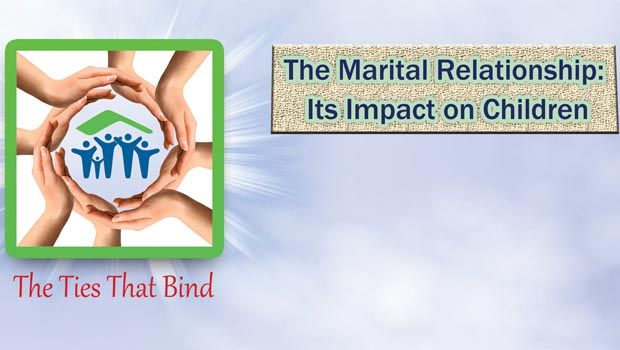He let out a huge sigh as he looked at himself in the mirror. He wondered how things had gotten this bad. The past few months had been difficult in the house. He and his wife had been arguing and although they did so quietly in the bedroom, the kids had been acting strangely. There’s no doubt they had been affected by this mess. He couldn’t wait around anymore for things to get better. It was time to do something about it…
The quality of our marriage relationship profoundly impacts our children
Allah (SWT) describes the relationship between husband and wife in the Quran: “Your spouses are a garment for you, and you are a garment for them” (2:187). This is the most beautiful description of the closeness, warmth, and security that a marital relationship is supposed to provide. And in another verse, He says, “It is He who created you from a single soul, and made its mate of like nature in order that he might incline towards her…”(7:189).This is a mutual inclining of man and woman that revolves around love and compassion. Unfortunately compassion is an ingredient that is missing in so many marriages today. Instead of understanding and accepting one’s partner and his/her experience, there is judgment, blame, and dissatisfaction. This contradicts the intended relationship in which the male and female not only incline toward each other, they complete each other. They are two parts of a larger whole, striving in their lives together with a spirit of interdependence, collaboration, and harmony.
The couple must be a cohesive unit as the marital relationship is the foundation of the edifice called family— the very base and infrastructure of the family system. When this marital underpinning is firm, the family structure stands elevated and strong against all challenges. Keeping this analogy in mind, let us look at what makes the family structure enduring and what causes it to crumble.
A Good Divorce vs. a Bad Marriage
Empirical evidence suggests that children are harmed less by the difficult circumstances of a divorce than the discord present in a dysfunctional family dynamic. There is the well-known hadith that “the lawful thing which Allah hates most is divorce,” but scholars point out that this refers to divorcing without a sound reason. Sometimes in anger a spouse will threaten divorce; but the hadith makes it clear that offhand, impulsive, or malicious bandying of the issue of divorce is unacceptable. Divorce is serious and displeasing to Allah SWT unless the discord is so grievous that maintaining the marriage would cause greater harm than ending it. Unfortunately though, cultural views in Muslim communities have so stigmatized divorce that unhappy spouses too often hide in shame their martial problems and thus are reluctant to seek help. But parents who are hostile to one another yet stay married only for the sake of the children may not be doing them any favors. A stable, mature, and peaceful environment is crucial to the healthy growth of a child. His or her mental and physical health is at risk when conflict predominates in the family dynamic. Studies performed by the University of Notre Dame have shown that a child’s apprehension and worry about his or her parents’ conflictual relationship directly correlates to negative mental health outcomes such as anxiety, depression, low self-esteem, and behavioral problems. In addition, parent marital conflict is related to digestive problems, fatigue, and chronic illness in children. Marital conflict can be exhibited in many ways, but the effects are similar. The slightest hint of aggression or hostility of a spouse towards the other sparks a sharp increase in cortisol levels and elevated heart rate in children. Children exhibit the same stress reaction when one or both parents yell, are contemptuous, insult, roll eyes, give out an exasperated sigh, avoid the partner, or use intimidation such as pointing a finger in a threatening way. Both the research on the effects of marital discord on children as well as the clinical experience of counselors show just how vulnerable children are to all types of marital conflict.
Teaching by Example
Children who witness unhealthy communication and other relational patterns between their parents grow up with inadequate understanding of what a healthy relationship is and what it encompasses. They have experienced the unhappiness resulting from parents trying to address conflicts without effective tools that maintain marriage unity and respect even in the midst of disagreement. Thus, the children themselves will more likely not possess the tools necessary to make their own relationships work in the future. Interestingly, witnessing marital conflict that is resolved with respect, warmth, and empathy has shown to have a very positive effect on children. By example, they learn how to manage the stress, frustration, and differences of opinion that can lead to conflict, and importantly, how to resolve conflicts, when they do occur, in a healthy manner. Parents are role models for their children and are responsible for providing to the best of their abilities a healthy, stable environment for the entire family to grow and succeed.
Healthy Couples, Healthy Families
According to Dr. John Gottman, successful marriages have a higher ratio of positivity versus negativity. Unfavorable factors exist in a good marriage but the spouses acknowledge that and then consciously choose to focus on the positive aspects of their relationship and their partners. In his book, The Seven Principles for Making Marriage Work, Dr. Gottman provides a roadmap for couples to work on their issues and become better partners. The seven principles discussed in the book include the following: enhance your love maps [knowing your partner in deep ways including his/her hopes and aspirations, stresses, emotional wounds, important life events, etc.], nurture fondness and admiration, turn toward each other instead of away, let your partner influence you, solve your solvable problems, overcome gridlock, and create shared meaning. For more details on what these principles are and how to live by them, refer to Dr. Gottman’s book.
Another pioneer on successful relationships is Salvador Minuchin, who has published numerous books on the subject of family structure. He stresses that the hierarchy of the family is very important, with husband and wife in charge, a team working together for the betterment of the family. Co-parenting is key, with both parents on the same page when it comes to discipline, reward, punishment, etc. Family roles are also focused upon, with each person playing a role such as scapegoat or dreamer or peacemaker, and whether that role is actually helpful or harmful to the family’s overall functioning. For more information on family structure including triangles, coalitions, and boundaries (all very significant when it comes to family functioning), refer to Minuchin’s published works.
Getting Help When Needed
The average couple waits six years —during which time problems worsen — before they seek help, according to extensive research done by Gottman. This means that the average couple lives with discord and unhappiness for far too long. Despite the stigma that exists against therapy, we as Muslims must understand that Islam encourages seeking help when it is needed. Prophet Muhammad (s) was the ultimate advice-giver and counselor. He listened actively and empathically to any individual seeking his counsel, considered their personal and spiritual maturity, and articulated his advice in a way that addressed their particular needs. The companions of the Prophet did not try to hide their weaknesses at all cost, but sought help when needed in order to improve themselves and elevate their characters.
This is a facet of personal courage that we must strive to emulate. Knowing that the quality of our marriage relationship profoundly impacts our children, we must find that courage within ourselves to better our own lives and that of our spouses, and contribute to a better future for our children.
May Allah (SWT) guide us all to the right path, ameen.






